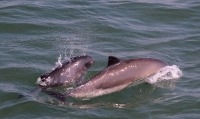
(Photo: Danielle Dion)
Harbour Porpoise
Phocoena phocoena
One of the smallest cetaceans, up to 1.7 metres long. They have a small, round head and a short, triangular dorsal fin. Their body is dark grey with a white underside and a dark stripe from the corner of their mouth to their pectoral fin. They can be hard to spot as they only surface briefly and their blow is rarely seen.
Authority
Linnaeus, 1758
Classification Details
Phylum: Chordata (chordates); Subphylum: Vertebrata (vertebrates); Class: Mammalia (mammals); Infraorder: Cetacea (whales and dolphins); Family: Phocoenidae (porpoises).
Habitat
Found in temperate and subarctic waters of the northern hemisphere. In the western Atlantic, they range from Greenland to Cape Hatteras. They prefer coastal waters (estuaries, bays, tidal channels, sometimes rivers) and waters no deeper than 200 metres. They occur in the Bay of Fundy from July to September. They are usually solitary or in small groups of two to five individuals.
Diet
Predators that feed on schooling fish such as anchovies and herring, and also eat squid and octopus. They feed in mid-water or on the seabed (usually no deeper than 200 metres). Porpoises use echolocation to help them find their prey - they send out sounds that bounce back off objects in the water and return to them as echoes. This helps them "see" what is there, even in murky water.
Reproduction
Sexes are separate. They reach sexual maturity between three and four years old. Females usually give birth to a single calf every year. Their gestation period is 11 months and they nurse their calf for up to 12 months. They typically live less than 10 years.
Fun Facts
The word porpoise comes from the Latin word for pig: porcus. The harbour porpoise is known as the puffing pig because of the sneeze-like sound it makes when it breathes.
References
COSEWIC (2006) COSEWIC assessment and update status report on the harbour porpoise Phocoena phocoena (Northwest Atlantic population) in Canada. Committee on the Status of Endangered Wildlife in Canada. Ottawa. vii + 32 pp. (https://www.canada.ca/en/environment-climate-change/services/species-risk-public-registry.html).
Eder T (2012) Whales and Other Marine Mammals of Atlantic Canada. Vancouver: Lone Pine Publishing.


